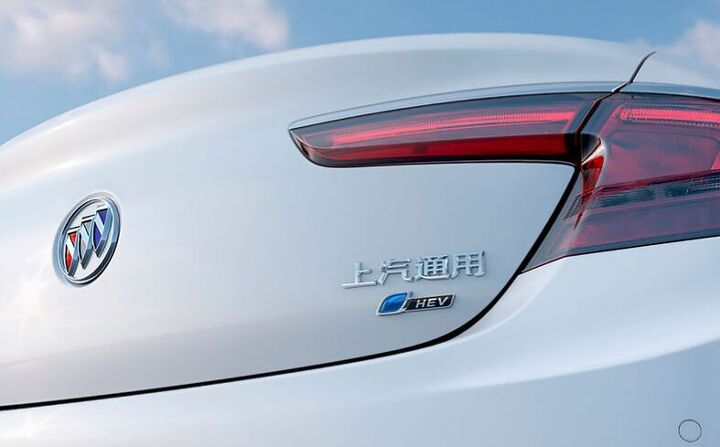Ford Follows GM's Lead as It Uncovers the Secret To Success in China: Prestige, Baby!

Ford Motor Company is finally figuring out the secret to General Motors’ most recent overseas sales success. Chinese shoppers are willing to pay more for a new car than consumers in other countries, but only if it piles on the luxury and, most importantly, prestige.
However, there’s still a long way to go before the Lincoln brand catches up to a surging Cadillac. That automaker only wishes it could find such sales gains in the United States.
According to stats published by The Motley Fool, General Motors sales in China rose 5.7 percent to 345,733 vehicles in October, a record-setting number for that month, and year-to-date sales are up 8.6 percent from the same period in 2015. While Buick has consistently been a major part of that equation, Cadillac is steadily creeping up in its appeal to affluent youngsters.
In fact, GM says Cadillac buyers in China are routinely half the age of those in the U.S. — averaging 35 years of age to their 59.5-year-old American counterparts. And that young blood isn’t afraid to exercise its purchasing power, either. Cadillac sales doubled compared to the previous October, giving the luxury brand its fourth consecutive month where China increased volume by over 50 percent.
For Cadillac, the XT5, XTS, and ATS long-wheelbase variant were up more than 70 percent year over year.
In 2015, Cadillac sold 80,000 cars in China compared to about 175,000 in the United States. This year, the goal for China is 100,000, and it looks like GM could hit that mark.
Meanwhile, Ford’s Asia Pacific unit earned $131 million in the third quarter, up from a modest $22 million a year prior. That had everything to do with China’s Changan Ford Automobile Co., which helped bring an additional 26 percent in equity over 2015. However this only came after some pricing adjustments after suffering an unwelcome second-quarter loss. Ford was caught with its pants down over the aggressive pricing offered by domestic Chinese rivals, and it lacks a big earner like Buick with its desirable image and heritage.
However, the Blue Oval has been considering whether to produce cars inside the country as Lincoln sales nearly tripled in China in the third quarter. While that sounds impressive, it only equates to 8,546 Lincoln vehicles. Cadillac sold 12,502 in October alone, but Ford might close the gap by building cars in-country, avoiding the heavy taxes placed on imported vehicles, and lowering prices.
Ford has learned the hard way that, while Chinese shoppers may be willing to pay more for a superior product, they are still hungry for a good value.
What they aren’t hungry for is General Motors’ cheap commercial vans. While SAIC-GM-Wuling offers inexpensive entries into to that segment, Ford’s Transit has fared much better in China despite its higher pricing. Wuling is also a low-budget brand, something Chinese consumers are quickly growing out of.
Buick, a premium brand, sells at almost the same volume as Wuling in China. Last month it was shy of the bargain brand’s 108,760 units by a mere 3,690 vehicles.
GM’s income from its Chinese venture is comparable with last year’s. Sales are up, but, like Ford, the automaker faces pressure from extremely affordable domestic Chinese automakers. That has shrunk profit margins and made General Motors’ premium brands all the more appetizing to both the seller and the buyer.
[Image: General Motors]

A staunch consumer advocate tracking industry trends and regulation. Before joining TTAC, Matt spent a decade working for marketing and research firms based in NYC. Clients included several of the world’s largest automakers, global tire brands, and aftermarket part suppliers. Dissatisfied with the corporate world and resentful of having to wear suits everyday, he pivoted to writing about cars. Since then, that man has become an ardent supporter of the right-to-repair movement, been interviewed on the auto industry by national radio broadcasts, driven more rental cars than anyone ever should, participated in amateur rallying events, and received the requisite minimum training as sanctioned by the SCCA. Handy with a wrench, Matt grew up surrounded by Detroit auto workers and managed to get a pizza delivery job before he was legally eligible. He later found himself driving box trucks through Manhattan, guaranteeing future sympathy for actual truckers. He continues to conduct research pertaining to the automotive sector as an independent contractor and has since moved back to his native Michigan, closer to where the cars are born. A contrarian, Matt claims to prefer understeer — stating that front and all-wheel drive vehicles cater best to his driving style.
More by Matt Posky
Latest Car Reviews
Read moreLatest Product Reviews
Read moreRecent Comments
- Master Baiter EV mandates running into the realities of charging infrastructure, limited range, cost and consumer preferences. Who could possibly have predicted that?
- Jkross22 Our experience is that the idea of leasing/owning an EV is better than the experience of getting a closer look at them and coming away underwhelmed.
- Ajla I never thought I'd advocate for an alphanumeric but "Junior" is a terrible name.
- Arthur Dailey So pay moving costs, pay penalties or continue to pay for space in the RenCen, and purchase all new furniture and equipment. Rather than just consolidating in place and subleasing. Another brilliant business decision.
- Jkross22 Why not just consolidate space and rent out to vendors at a reduced rate? Wouldn't this help with coordination and partnerships as well as letting go of unused space, turning it into a revenue generation opportunity as well as a PR win where GM could offer younger companies great space to develop ideas? Oh right, that might make more financial sense. Can't take the OLD GM out of GM.


































Comments
Join the conversation
That is one reason why our vehicles are more global in nature than as in the past where cars and vans were more specific to America (pickups are still more US). The US is no longer the largest market with China and Asia becoming the largest market.
Motley Fool is still a thing?